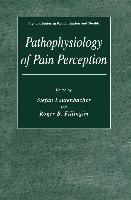- Start
- Pathophysiology of Pain Perception
Pathophysiology of Pain Perception
Angebote / Angebote:
Readers have access to legions of books dealing with the molecular, genetic, neurochemical, neurophysiological, neuroanatomical, neuroradiological and psychological aspects of pain as well as with the clinical approaches to pain from various medical disciplines. Why then is it necessary to publish a book on the pathophysiologyofpain perception? Pain can result either from noxious events due to lesions, injuries, diseases, etc. , or from disturbances in the system transducing, transforming, and processing the potential pain signal or from an interaction of both. Under certain pathological conditions, the pain-processing system, which includes both physiological and psychological components, can produce the experience of pain in the absence of any peripheral noxious event. This book primarily ex amines these pathological alterations in the pain-signalling system, and the authors provide information on the functioning of the pain-processing system under normal and pathological conditions. The understanding of pain perception is essential for optimal diagnosis and treatment of acute and chronic pain. Considerable evidence now indicates that alterations in pain per ception are characteristic of many clinical pain states. Whether disturbed pain perception is a truly etiological or only a maintaining factor-c-or even a mere epiphenomenon of chronic functional pain-is reviewed in detail by L. Arendt-Nielsen, C. R. Covelli, R. B. Fillingim, ]. M. Gillespie, T. Graven-Nielsen, E. Kosek, S. Lautenbacher, M. Peters, A. Pielsticker, DO. Price, G. B. Rollman, P. Svensson and G. N. Verne for headache, back pain, fibromyalgia, myofascial pain, temporomandibular pain disorder, irritable bowel syndrome and menstrual cycle-related pain disorders.
Folgt in ca. 15 Arbeitstagen
